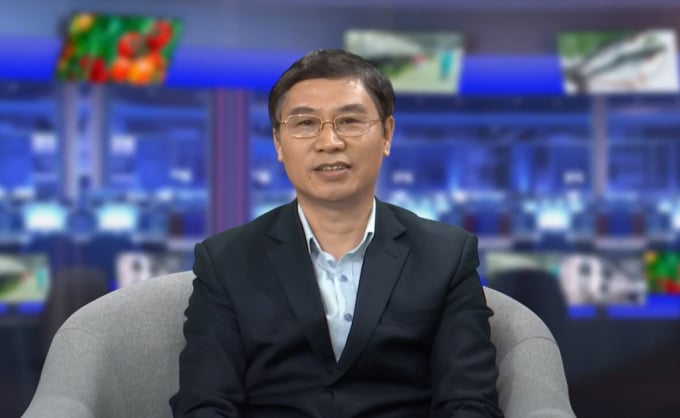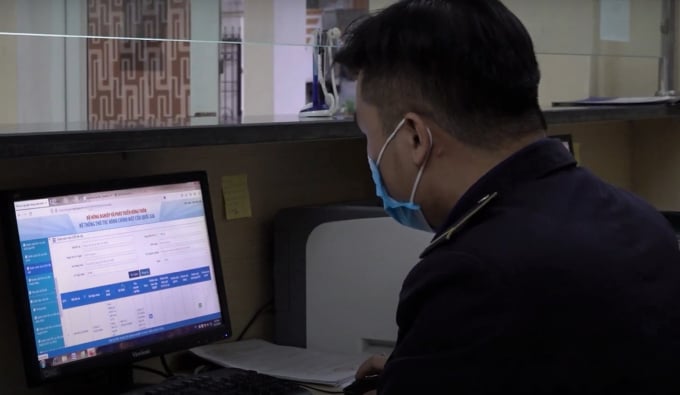May 21, 2025 | 10:22 GMT +7
May 21, 2025 | 10:22 GMT +7
Hotline: 0913.378.918
May 21, 2025 | 10:22 GMT +7
Hotline: 0913.378.918

Mr. Nguyen Quy Duong, Deputy Director of the Plant Protection Department (MARD). Photo: NH.
According to Mr. Nguyen Quy Duong, Deputy Director of the Plant Protection Department (MARD), the Plant Protection Department currently has 8 procedures on the National Single Window, including Quarantine of imported plants; Plant quarantine for export; Plant quarantine in transit; Issuing plant protection drug licenses; Check the quality of imported plant protection drugs; Issuance of fertilizer import license; Issuing permits for quality inspection of imported fertilizers and food safety inspection procedures for exported goods.
In which, 7 procedures were carried out on the National Single Window. Remarkably, the food safety inspection procedure for exported goods has not been done on the National Single Window because there has not been an administrative procedure for two years because foreign food safety agencies have not yet requested it.
Regarding implementing the National Single Window system procedures, the Plant Protection Department is implementing three phytosanitary procedures: import plant quarantine, export plant quarantine, and transit plant quarantine. The average number of procedures is 200,000 each year.
Previously, a Plant Quarantine Sub-Department of Region II, when carrying out procedures for export or import goods in the area, was always very crowded. The Plant Protection Department had to arrange 7 people to issue and return certificates and collect money.
Now, when done through the National Single Window, all receipts and returns are electronic. Recently, the Plant Protection Department has also coordinated with the General Department of Customs and Viettel to collect fees electronically. Businesses only need to pay money via the electronic system to complete the procedure, no longer need to go directly to the one-stop counter to pay fees like before.

The Plant Protection Department has implemented 8 procedures in the National Single Window country. Photo: NH.
The implementation of the National Single Window shortens the time for businesses and the State management agencies themselves, saving a lot of time and effort.
The implementation of the National Single Window, towards the performance of the ASEAN Single Window, there are still some issues that need to be reviewed and handled, especially the software system.
For example, for software from 2015 - 2016, the Plant Protection Department must regularly coordinate with the General Department of Customs, Viettel, to fix problems. The software does not always run smoothly.
Therefore, the Plant Protection Department suggested that the connection system from the General Department of Customs to ministries and branches, including the Ministry of Agriculture and Rural Development, needs to be regularly updated and revised.
However, like the Plant Protection Department, units invest and build software, transmission lines, and server systems. The Department continues to train and update opinions of businesses, units of relevant ministries, and branches to adjust to arising issues.
With the ASEAN Single Window procedure as the focal point of the General Department of Customs, on the legal basis, there are many inconsistent regulations between countries related to import and export procedures.
Vietnam currently stipulates that agricultural products must be certified. The certificate must be on paper (as specified in the Law on Quarantine and Plant Protection). Therefore, it is necessary to have negotiations at the national level, to be able to accept electronic certificates when issued. Relevant legal documents and regulations also need to be revised, and new documents promulgated, moving towards implementing the ASEAN Single Window.
Translated by Ha Phuc

(VAN) Dong Thap farmers attained an average profit margin of 64% during the summer-autumn 2024 crop (first season), while An Giang and Kien Giang farmers followed with 56% and 54%, respectively.

(VAN) As a doctoral student doing research on renewable energy and electrification at Harvard University, the author shares his musings on electricity, nature, and countryside memories.

(VAN) The decree on Extended Producer Responsibility (EPR) ensures transparent management and disbursement of support funds, avoiding the creation of a “give-and-take” mechanism.

(VAN) Hue City rigorously enforces regulations regarding marine fishing and resource exploitation, with a particular emphasis on the monitoring of fishing vessels to prevent illegal, unreported, and unregulated (IUU) fishing.

(VAN) Hanoi People's Committee has issued a plan on reducing greenhouse gas emissions in the waste management sector with 2030 vision.

(VAN) Vietnam's draft amendment to Decree No. 156 proposes a mechanism for medicinal herb farming under forest canopies, linking economic development to population retention and the sustainable protection and development of forests.

(VAN) In reality, many craft village models combined with tourism in Son La have proven effective, bringing significant economic benefits to rural communities.